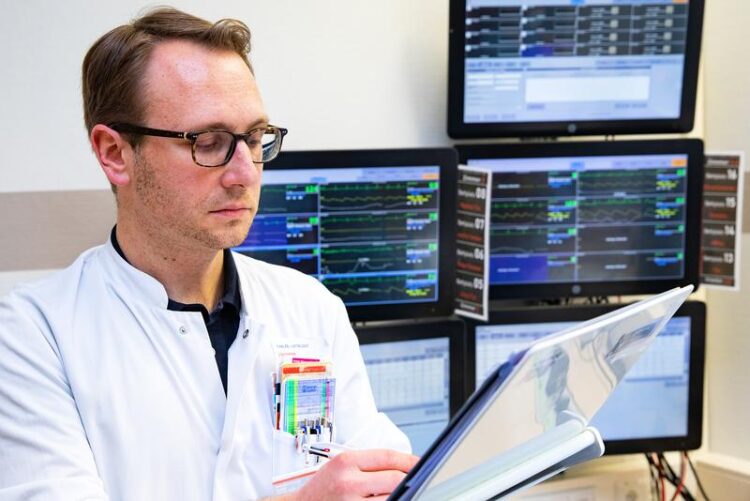Neurology team researches mechanisms of repeated strokes

PD Dr. Gerrit Große looks at clinical data from stroke patients on the stroke unit.
Copyright: Karin Kaiser / MHH
How can people be prevented from being affected again after a stroke? In order to find new therapeutic approaches for prevention, the international CRESCENDO consortium led by the MHH is conducting research at the molecular level.
In Germany, 270,000 people suffer a stroke every year. This can result in severe disabilities: Paralysis, speech disorders and problems walking. Often, it does not remain a one-time event. Many patients experience a recurrence of the stroke and further deterioration of their health. How do these recurrences occur and how can they be prevented? Researchers in the multinational CRESCENDO consortium are investigating this question. The scientists from Hannover, Seville and Basel/Zurich want to find out what happens in the body on a biological level as a result of a stroke. Associate Professor Dr. Gerrit Große from the Department of Neurology at Hannover Medical School (MHH) is coordinating the study. The project is funded by the European research network ERA-NET NEURON with 770,000 euros for three years.
20 percent of all strokes are recurrences
A stroke is a sudden circulatory disorder in the brain. In most cases, it is triggered by a vascular occlusion, less frequently by a hemorrhage in the brain. “In recent years, there have been significant advances in acute treatment. But the number of strokes is still very high,” explains Dr. Große. That’s especially true for recurrent strokes, which account for about 20 percent of all strokes, he said. “This suggests that currently available measures to prevent recurrent strokes are not sufficiently effective in many patients,” Dr. Große explains. Currently, preventive measures aim to inhibit blood clotting and minimize the influence of common risk factors, such as hypertension and diabetes. “The complex pathophysiology of stroke, i.e., the disease processes, is currently given too little consideration in the prevention of repeated strokes,” the physician notes.
In search of molecular mediators
In order to develop new strategies for preventing recurrent strokes, the CRESCENDO consortium now wants to better understand the pathophysiology. Therefore, the international team wants to investigate the processes at the molecular level. In doing so, the scientists are searching for molecular mediators, which are messenger substances such as hormones, proteins or DNA fragments. “Certain mediators can be released by a stroke and trigger processes elsewhere in the body, which in turn could increase the risk of another stroke,” Dr. Große explains the hypothesis of the study. “If we know these mediators and their concentration in the blood, new therapeutic preventive approaches could be developed specifically.”
5,000 blood samples will be studied
The three consortium partners are contributing their specific methodological expertise to the study and will evaluate blood samples from a total of 5,000 patients. In doing so, they will focus on a large number of molecular mediators on the one hand and on very specific, pre-selected molecules on the other. Since it is already possible to react to the selected mediators with drugs, Dr. Große expects that innovative strategies for secondary stroke prevention could be implemented in clinical practice relatively soon.
SERVICE:
For more information, contact PD Dr. Gerrit M. Große, grosse.gerrit@mh-hannover.de, phone (0511) 532-3580 and visit https://www.neuron-eranet.eu/projects/CRESCENDO/.
Media Contact
All latest news from the category: Health and Medicine
This subject area encompasses research and studies in the field of human medicine.
Among the wide-ranging list of topics covered here are anesthesiology, anatomy, surgery, human genetics, hygiene and environmental medicine, internal medicine, neurology, pharmacology, physiology, urology and dental medicine.
Newest articles

NASA: Mystery of life’s handedness deepens
The mystery of why life uses molecules with specific orientations has deepened with a NASA-funded discovery that RNA — a key molecule thought to have potentially held the instructions for…

What are the effects of historic lithium mining on water quality?
Study reveals low levels of common contaminants but high levels of other elements in waters associated with an abandoned lithium mine. Lithium ore and mining waste from a historic lithium…

Quantum-inspired design boosts efficiency of heat-to-electricity conversion
Rice engineers take unconventional route to improving thermophotovoltaic systems. Researchers at Rice University have found a new way to improve a key element of thermophotovoltaic (TPV) systems, which convert heat…



